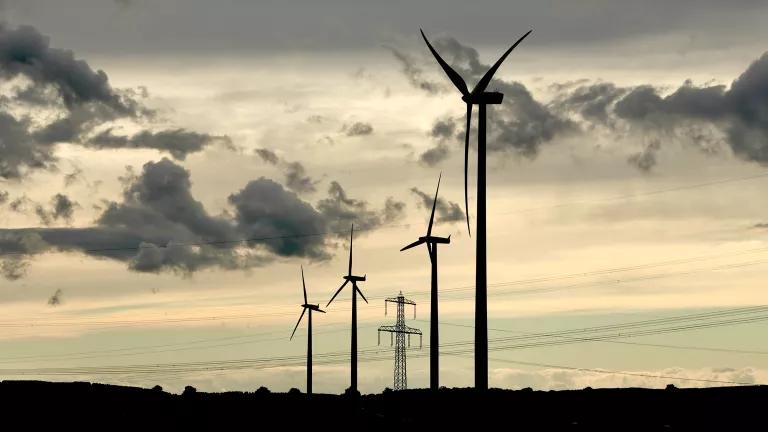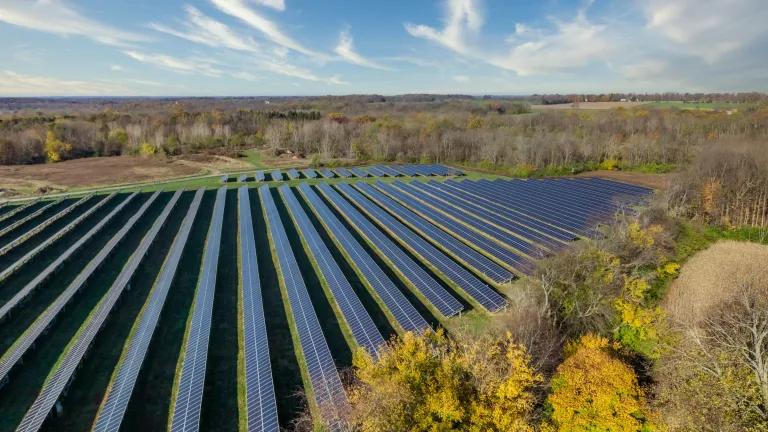Clean Energy Transition Continues Despite Procedural Pause on Clean Power Plan

The Supreme Court recently put a hold on the nation's historic climate change fighting plan to reduce carbon pollution from power plants, but despite this development, response within the electric power sector signals that robust progress toward carbon pollution reduction and a cleaner energy future will continue. While disappointing, the Supreme Court's order placing a stay on implementation of the Obama Administration's Clean Power Plan is only a procedural pause in the process and not a decision on the merits of the case. We continue to believe the Clean Power Plan will be upheld on its merits after the ongoing litigation runs its course and the stay will be lifted.
Meanwhile, as many states are pledging to continue moving forward with their plans for compliance and related stakeholder outreach under the Clean Power Plan, several power companies are voicing their continued support for state compliance efforts. Power companies are also affirming their commitment to moving to cleaner energy resources regardless of regulatory requirements.
Here are some examples of what major power companies across the country are saying about the Supreme Court's delay of Clean Power Plan implementation:
"We're still going to continue to look to ways to cost-effectively expand our commitment to renewable resources," said Ry Schwark, a spokesman for PacifiCorp, which has operations in Oregon, Washington, California, Utah, Wyoming and Idaho. PacifiCorp -- a signatory to the White House's American Business Act on Climate Pledge in December, supporting the U.N. climate talks in Paris -- intends to "continue to work with states as they develop their plans," Schwark said. Schwark said he thought the ruling would encourage states that have been writing carbon regulations, like Oregon and Washington. "This development is just likely to accelerate the momentum for state action," he said. (PacifiCorp)
"Dominion Virginia Power also said it will 'continue to move forward to comply with the Clean Power Plan.'" (Dominion Virginia Power)
"FirstEnergy Corp. spokesman Todd Schneider said the company will continue working with states that are developing plans to comply while the court battle continues. 'While the legal challenges are addressed, we will work with our states if they chose to continue development of their compliance plans,' he said." (FirstEnergy)
"Southern California Edison expressed disappointment in the court's ruling but added that 'SCE supports the Clean Power Plan and will maintain an active role in supporting California's efforts to reduce greenhouse gas emissions, including support for renewable energy, transportation electrification, energy efficiency and innovative, clean energy technologies.'" (Southern California Edison)
"Calpine Corp. spokesman Brett Kerr said the move wasn't something the market actually anticipated. 'We'll continue to be supportive of the Clean Power Plan,' he said, pointing to a 'natural evolution of the market anyway' away from less efficient coal plants. 'So it won't really dictate us to change our strategy too much, which is to focus on being the premier operator of gas-fired plants in the United States.' He said it's not in anybody's interest to have a federal implementation plan that dictates compliance for Texas." (Calpine)
"Exelon Corp., the nation's largest nuclear operator, said, 'Regardless of this procedural development, the Supreme Court already has ruled that carbon is a pollutant the EPA must regulate. Our customers want reliable, clean and affordable electricity, and Exelon remains committed to helping drive the national transition to a low-carbon future.'" (Exelon)
"JEA is facing more serious changes under the Plan because- unlike Clay- they generate power. Because of that, they're still moving forward with planning and talks which were underway. 'Just because the ruling has been paused, there's not any definitive on how that will play out,' says JEA's Director of Environmental Programs Jay Worley. . . . Regardless of what happens with the Plan, Worley says JEA plans to continue examining more environmentally friendly ways to generate energy." (JEA)
"'Despite the Supreme Court's decision, National Grid still strongly supports EPA's Clean Power Plan,' said Dean Seavers, president of National Grid, U.S. 'We stand by our belief that the CPP is not only reasonable and achievable, but imperative to meeting the nation's greenhouse gas reduction commitment established at COP21.' 'As we continue to stress with our customers and industry partners, tomorrow's power grid and energy supply chain must look different than today's,' Seavers went on to say. 'Climate change is a global imperative, and we must find ways to transition our energy industry into a decarbonized future. That means every player--including system operators, generators, distributors, and policy makers--must collaborate at a level our country has never seen before.'" (National Grid)
"Pacific Gas and Electric Co. said it was 'disappointed' by the ruling. 'We believe EPA has ample legal authority to pursue the Clean Power Plan,' said Vice President of Federal Affairs and Policy Melissa Lavinson, calling EPA's rule 'measured and reasonable.' 'PG&E will continue to support the Clean Power Plan and will move forward with the many steps we are taking to support California's commitments to reduce greenhouse gases.'" (Pacific Gas and Electric)
"Pahl Shipley, director of corporate communications at New Mexico-based PNM Resources Inc., said the stay doesn't affect the company's plan to lower the use of coal significantly by retiring two units at the San Juan Generating Station. 'We'll monitor developments and continue to work with the state, but regardless of the outcome the company is moving forward to cut carbon emissions and add cleaner resources to our portfolio, including solar and natural gas,' Shipley said." (PNM Resources)
"PSEG 'firmly believes that carbon emissions need to be reduced. We do believe that climate change is a serious issue; all the science points to that. It is real, and action needs to be taken; it's not going to wait for us to get our legal or political act together,' [Chairman, President and CEO Ralph] Izzo said. 'So what we've said is, let's just keep marching on the path we've got. I've always predicted this is not going to be decided anywhere but at the Supreme Court,' he said." (Public Service Enterprise Group)
"'While the Supreme Court's ruling is a significant development in this case, the merits of the case have not been decided and the legal proceedings will continue,' Minneapolis-based Xcel Energy Inc. said in a prepared statement. Regardless of the final outcome, Xcel said it will continue to work with states and stakeholders on plans 'to create sustainable and affordable energy futures.' 'This approach will not only ensure compliance with existing and new regulations, but also take advantage of new technologies, recognize evolving customer needs and continue to drive improvements in how we produce and deliver energy,' the Fortune 500 utility said.' (Xcel Energy)
Statements by Edison Electric Institute, the trade association for the nation's investor owned utilities, are also notable:
"The Supreme Court action 'doesn't really change anything,' said Quin Shea, vice president for environment at the Edison Electric Institute, the lobby for investor-owned utilities. Speaking to Wall Street executives yesterday in New York, Shea said larger trends -- such as coal retirements, cheap natural gas, environmental regulations, cheaper renewables and new business models -- aren't going away, regardless of what happens with the CPP. 'We're still reducing CO2, and the general curve, in terms of our emissions reductions, that's not going to change because of what happened yesterday,' Shea said. 'You don't simply put the genie back in the bottle when it comes to major strategic investments that the captains of industry are making.'" (Edison Electric Institute)
Not all power companies or states favor the Clean Power Plan, but a broad base of supportive companies and state jurisdictions are leading the way to further carbon pollution reductions. EPA has also indicated that it will keep working with states that seek to continue on the path toward Clean Power Plan compliance.
There is wide recognition within the energy industry and states that a transition to a lower carbon future is already underway and unstoppable. Strong public support exists for fighting climate change, which is fueled by power plant carbon pollution. With this broad public consensus, the critical work of our regulators and energy industry continues to advance. And so does the clean energy revolution.



